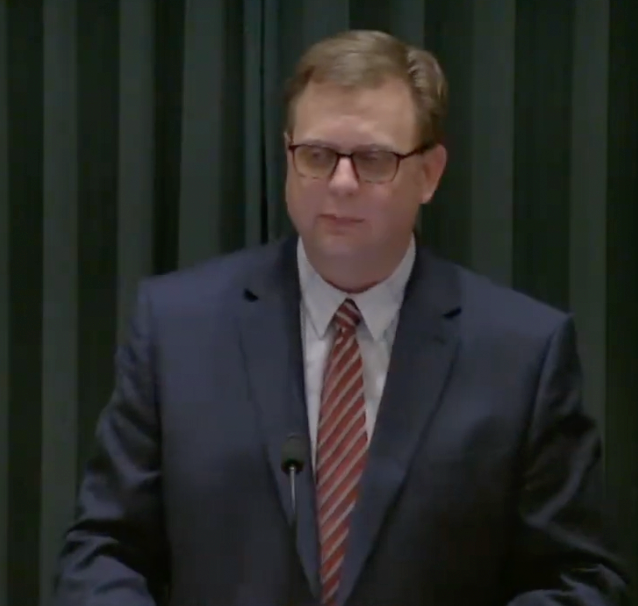
"Grow in grace, and in the knowledge of our Lord and Saviour Jesus Christ. To him be glory both now and for ever. Amen." - 2 Peter 3:18
Have you ever heard someone say that they "believe Christ's sacrifice was sufficient for all, but efficient only for the elect?" It sounds awful to my trained ears and eyes. It doesn't make any sense to me because Christ's death was not in any way for the whole world - but only His sheep. But it's a phrase that has been uttered by many believers in ignorance. And sometimes I think people don't know what it is they are talking about. They hear a phrase, and then they repeat it without even thinking about what it is they are saying.
Other poorly worded phrases you might hear from some believers are as follows:
- It takes more than belief, you gotta trust!
- I'm gonna pray through that.
- God will not disrespect your will.
- God helps those who help themselves.
- The Holy Spirit is a gentleman.
- Good luck!
- The longest journey is the 18 inches from your head to your heart.
- You gotta hold to God's unchanging hand.
And the list can go on and on and on. I've heard many phrases from self identifying believers that can be considered as anti-gospel when properly examined. I like to call these freewiller shibboleths because they are commonly used amongst freewillers. Wikipedia refers to a shibboleth as "any custom or tradition, usually a choice of phrasing or even a single word, that distinguishes one group of people from another." And I have in the past also called these grace killing phrases. Ironically, that too is a freewiller shibboleth because we know that God's grace cannot be killed.
In a recent article I was trying to say that some people who utter these free-willer phrases are not necessarily unbelievers. Some might even come out and say that they believe in "free will", without really knowing what the "free will" gospel is. They just believe they are free to do what they want and they call that "free will." Politicians use this phrase all the time and generally aren't talking about salvation conditioned upon the volitional thoughts of an individual. So I believe that God's untaught people can utter all kinds of silliness and nonsense without really thinking about what it is they are saying. And many of God's people have picked up all kinds of shibboleths as they were raised and steeped in false religion. And a believer, especially in their early believing life, can bring with them all kinds of phrases and practices that they haven't thought through very well. They don't know and usually haven't thought through the implications of their speech. Even recently, after years of knowing and loving the Gospel, the Lord has brought to light to my mind some of my practices and my speech that in reality is Gospel denying when logically examined. This is part of growing in the grace and knowledge of Christ.
As people begin to believe the Gospel of sovereign grace, the absolute satisfaction of Christ and the imputation of His righteousness, the Holy Spirit begins to teach them the logical conclusions and implications of phrases like these. And this doesn't necessarily happen all at once. But once the Lord brings to light issues such as these, and they are examined honestly and thoroughly, God's people usually shed this language and start to speak more correctly. But sometimes some of these phrases can persist for many years, and even the entire life of a believer. And we as brethren should be patient and loving with those who use langauge like this. We should be willing to lovingly and patiently point out the error, the logical implications, and help our brethren to correct their speech.
We need to be an encouragement to God's people, and not one that discourages by judging too harshly when such phrases are uttered. I have seen too many dear souls ripped to shreds by folks for not phrasing something properly and it has bothered me so much that I've been moved to write articles that address these subjects. Of course I don't believe we should hold hands with those that willfully persist in ignorance, and those who blatantly teach false gospel doctrine. Many of my detractors may be thinking I believe we should now compromise on the truth. That's not true at all. However, I'm just calling for more patience and love for people and to be willing to help them overcome error, and not in anyway hinder them by being harsh or hyper-critical.
“Beloved, let us love one another; for love is of God; and everyone that loveth is born of God and knoweth God” (1 John 4:7). And let us strive to “keep the unity of the Spirit in the bond of peace” (Ephesians 4:3). If you hear me or another dear soul that uses a phrase that you dislike, please forgive us and please don't write us off. God continues to love all of His children for Christ's sake, never holding anything against them. Let us strive to continue to do likewise.
Grace and Peace,
Brandan
Note: This article was created because a few folks have written me in response to my article "Are Freewillers Brethren" and asked me what I meant about how folks holding to freewiller shibboleths could be brethren.